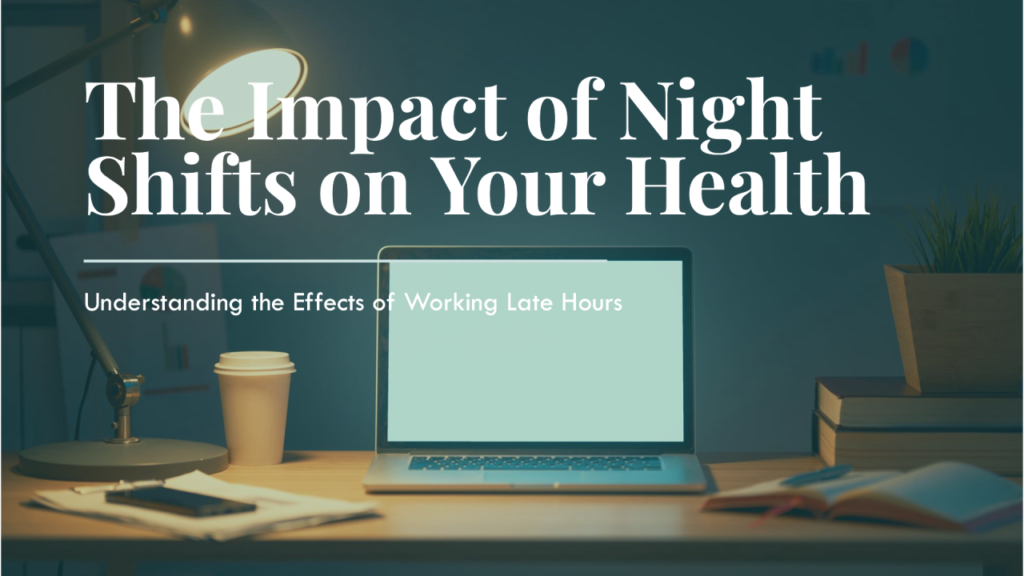A medical excuse to not work night shift can feel like a lifeline when you’re dealing with the exhaustion that comes from sleepless nights.
I remember the night I stumbled through my shift, struggling to keep my eyes open, while my mind raced with worry. I felt overwhelmed and stressed, questioning how I could address my health needs without risking my job.
I started looking for answers and found out that many others felt the same way. They were stuck in the cycle of sleepless nights and exhausting shifts. It was comforting to know I wasn’t alone, but I realized I needed to take action.
If you want to know how I overcame this challenge and secured the support I needed, keep reading. I’m here to share the steps I took and how you can do the same. Let’s jump in!
Understanding How to Secure A Medical Excuse to Not Work Night Shift

The reality of night shifts can be more than just inconvenient; for many, it’s a genuine health concern. If you’re feeling drained and overwhelmed, you might be wondering, “Is there a way out?”
Understanding the ins and outs of a medical excuse to not work the night shift is crucial for your well-being.
So, What Exactly is A Medical Excuse?
In simple terms, it’s a formal note from a healthcare professional that justifies your need to avoid night shifts due to health issues.
This could range from physical ailments, like sleep disorders or chronic fatigue, to mental health concerns, such as anxiety or depression.
Having a medical excuse is not just about avoiding work; it’s about acknowledging that your health deserves priority.
Common Medical Conditions Justifying a Medical Excuse
Did you know that certain medical conditions can give you valid reasons to avoid night shifts? Here they are;
- Sleep Disorders: Conditions like insomnia and sleep apnea can severely disrupt your ability to function effectively at work.
Insomnia makes it difficult to fall or stay asleep, while sleep apnea causes interruptions in breathing during sleep.
The result? Feeling exhausted every day because your body can’t adjust to a night schedule. This constant fatigue can lead to decreased performance and increased mistakes on the job.
- Mental Health Challenges: Anxiety and depression can significantly complicate the experience of working night shifts. The stress of working against your natural body clock can exacerbate these mental health conditions.
Night shifts may lead to increased feelings of isolation and anxiety, making it hard to cope with daily responsibilities.
- Chronic Health Issues: Conditions such as diabetes and heart disease often require specific routines that night shifts can disrupt.
For instance, individuals with diabetes need to manage their blood sugar levels carefully, which can be challenging without a consistent schedule.
Heart disease may necessitate regular monitoring and lifestyle adjustments that night work can interfere with.
- Chronic Fatigue: The impact of fatigue itself cannot be overlooked. Chronic tiredness affects your performance, focus, and overall quality of life.
It can lead to irritability, poor concentration, and decreased productivity.
Recognizing that this fatigue stems from working night shifts is vital in advocating for a medical excuse to not work night shifts.
Understanding these common medical conditions is the first step in making a strong case for your need to avoid night shifts.
Why is it so Important to Secure This Medical Excuse?
For one, your health impacts every part of your life. Night shifts can disrupt your sleep patterns, leading to long-term issues if not addressed.
By obtaining a medical excuse, you’re taking a proactive step to protect your well-being and ensure that your employer understands your needs.
This can lead to better work conditions and even improved productivity when you do work.
Overview of Night Shift Challenges
Now, let’s take a moment to discuss the challenges of night shifts. Working at night can throw off your natural circadian rhythm, making it hard to fall asleep and stay alert during shifts.
Common issues include insomnia, increased stress levels, and a heightened risk for various health problems. These aren’t just minor inconveniences; they can seriously affect your quality of life.
Understanding these challenges can empower you to advocate for yourself. You deserve to work in an environment that supports your health and well-being.
As we move forward, we’ll identify the specific health conditions that can justify your request for a medical excuse, the steps to obtain the necessary documentation, and how to effectively communicate your needs with your employer.
Your health matters, and taking these steps can make a significant difference. Let’s continue!
Steps to Secure Your Medical Excuse

- Consult a Healthcare Professional: Securing a medical excuse starts with consulting a healthcare professional. Choosing the right doctor is crucial.
You want someone who understands your situation and can provide the necessary support. Whether it’s a general practitioner or a specialist, finding the right fit can make a difference.
- Be Open During Your Appointment: During your appointment, be open about your struggles. Discuss the challenges you face with night shifts and how they impact your health.
This transparency helps your doctor understand your needs and provide the appropriate documentation.
Obtain Documentation
- Request Essential Documentation: Documentation is essential. Typically, a medical letter is required, outlining your health issues and the need for a schedule change.
This letter serves as your formal request for accommodation.
- Be Clear About Your Needs: When requesting this letter, be clear about what you need. Specify that you’re looking for a medical excuse to not work night shifts.
Your doctor will appreciate your clarity, and it will speed up the process.
Understand Your Rights
- Familiarize Yourself with Labor Laws: What are your rights regarding medical accommodations? Familiarizing yourself with labor laws can empower you to advocate for yourself.
In many places, laws protect employees with medical conditions, allowing for reasonable accommodations like avoiding night shifts.
- Know Your Company Policies: Additionally, it’s essential to know your company’s policies on medical excuses.
Each organization may have different requirements, so doing your homework can save time and stress.
Communicating with Your Employer
- Schedule a Private Meeting: Approaching your employer about your medical needs can feel daunting, but it’s essential for your well-being.
Start by scheduling a private meeting with your manager or HR. This shows that you take the situation seriously and want to discuss it respectfully.
- Discuss Your Needs Clearly: When discussing your needs, be clear but also empathetic.
Explain how your health affects your work and why you’re requesting a change. Maintaining professionalism throughout this conversation is important..
It demonstrates that you value your job while prioritizing your health.
Alternatives to Night Shifts
- Look for Flexible Work Options: What if you could explore alternatives instead of avoiding night shifts altogether? Flexible work options might be available.
Many employers understand the challenges of night work and may be open to adjusting schedules.
- Consider Shift Swaps and Remote Work: Discussing shift swaps with colleagues can also be a practical solution.
Sometimes, a simple conversation can lead to a win-win for everyone involved. Additionally, consider the possibility of working from home if your job allows it.
This can help maintain productivity without the strain of night shifts.
The Impact of Working Night Shifts on Health: Why a Medical Excuse is Essential

Working night shifts can create a myriad of health challenges for employees. From disrupted sleep patterns to increased stress, the effects of overnight work can be significant.
For shift employees, the struggle to maintain a healthy work-life balance becomes even more pronounced. Night shift work can lead to a variety of health problems, including gastrointestinal issues, obesity, and even mood disorders.
These challenges not only affect your physical health but also your overall well-being. Insufficient sleep, particularly rem sleep, can result in drowsiness and decreased productivity during workdays.
If you find yourself feeling overwhelmed, it’s crucial to address these issues with your physician. Discussing the impact of night shifts on your health can help you secure a medical excuse to not work night shifts. By obtaining a medical letter outlining your condition, you’ll be better equipped to advocate for your needs with your employer.
Recognizing that working night shifts can run the risk of long-term health complications is key. Whether it’s managing stress or ensuring you get enough sleep, taking proactive steps is essential. You might be unable to perform at your best if you’re constantly battling the effects of sleep deprivation.
Finally, understanding the health implications of night shifts can empower you to take action. With the right support and documentation, you can prioritize your health while effectively communicating your needs to your employer.
Final Thought
Addressing your health needs is not just important; it’s necessary. By taking proactive steps to secure a medical excuse, you’re prioritizing your well-being.
Remember, your health should never take a back seat to work demands. If you’re struggling with the challenges of night shifts, consider your options and take the steps that are right for you.
Comment.


